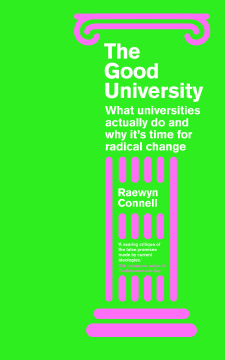
Additional Information
Book Details
Abstract
The higher education industry might seem like it’s booming, with over 200 million students in universities and colleges worldwide and funds flowing in like never before. But the truth is that these institutions have never been unhappier places to work. Corporate-style management, cost-cutting governments, mobilisations by angry students and strikes by a disgruntled workforce have taken their toll — in almost every country around the world. It’s no wonder that there is talk of ‘universities in crisis.’
But what should a ‘good university’ look like? In this inspiring new work, Raewyn Connell asks us to consider just that, challenging us to rethink the fundamentals of what universities do. Drawing on the examples offered by pioneering universities and educational reformers around the world, Connell outlines a practical vision for how our universities can become both more engaging and more productive places, driven by social good rather than profit, helping to build fairer societies.
Raewyn Connell is Professor Emerita at the University of Sydney. She is a highly-cited researcher in social science and an experienced teacher who has worked in universities around the world. She remains an active trade unionist and advocate for workers’ rights, student autonomy and educational reform. Her books include Masculinities (2005), Southern Theory (2007) and Gender: In World Perspective (2015).
‘A uniquely revealing global account of the actual work done by university workers, and a searing critique of the false promises made by current ideologies. A must read for those interested in progressive university reform.’
D.W. Livingstone, author of The Education-Jobs Gap
‘One victim of Western modernity and corporate ambition is the university. Raewyn Connell convincingly demonstrates what many are sensing and others are ignoring: that knowledge for peace and joy is being overruled by competing knowledges of war and death.’
Walter Mignolo, Duke University
‘Raewyn Connell’s case for the good university will resonate with the people who do the work to make good education and research happen, who care about the students and their colleagues and know their responsibility to the public who rightly expect so much of our universities. Her good university values the labour of all staff with decent, secure jobs.’
Jeannie Rea, National Tertiary Education Union
Table of Contents
| Section Title | Page | Action | Price |
|---|---|---|---|
| Front Cover | Front Cover | ||
| About the Author | ii | ||
| Title Page | iii | ||
| Copyright | iv | ||
| Contents | v | ||
| Introduction | 1 | ||
| 1: Making the knowledge: research | 11 | ||
| Being a researcher | 12 | ||
| The work of research | 17 | ||
| The knowledge formation | 24 | ||
| Research and truth | 30 | ||
| 2: Learning and teaching | 37 | ||
| The work of learning | 39 | ||
| The course being run | 43 | ||
| The work of teaching | 48 | ||
| 3: The collective intellectual: university workers | 54 | ||
| Intellectuals | 54 | ||
| Operations workers | 56 | ||
| Academic workers | 63 | ||
| Sustainability crisis | 68 | ||
| 4: The global economy of knowledge | 73 | ||
| Imperial science | 74 | ||
| Making a world university system | 79 | ||
| Making a worldwide workforce | 85 | ||
| Multiple knowledge formations and Southern theory | 91 | ||
| 5: Privilege machines | 95 | ||
| The dark side of the university | 95 | ||
| Making advantage happen | 101 | ||
| Breaching the walls | 105 | ||
| Machine limits | 109 | ||
| 6: The university business | 115 | ||
| The maelstrom | 115 | ||
| What enterprise universities sell | 119 | ||
| The managers | 124 | ||
| Telling lies about universities | 130 | ||
| Maelstrom reconsidered | 135 | ||
| 7: Universities of hope | 140 | ||
| Histories of invention | 141 | ||
| Contemporaries | 150 | ||
| Struggle and joy: lessons of experience | 163 | ||
| 8: The good university | 168 | ||
| The choice of futures | 168 | ||
| Criteria for a good university … | 171 | ||
| … and a good university system | 175 | ||
| Manifestos and visions | 177 | ||
| Taking action | 186 | ||
| Notes | 193 | ||
| References | 204 | ||
| Acknowledgements | 227 | ||
| Index | 228 |
